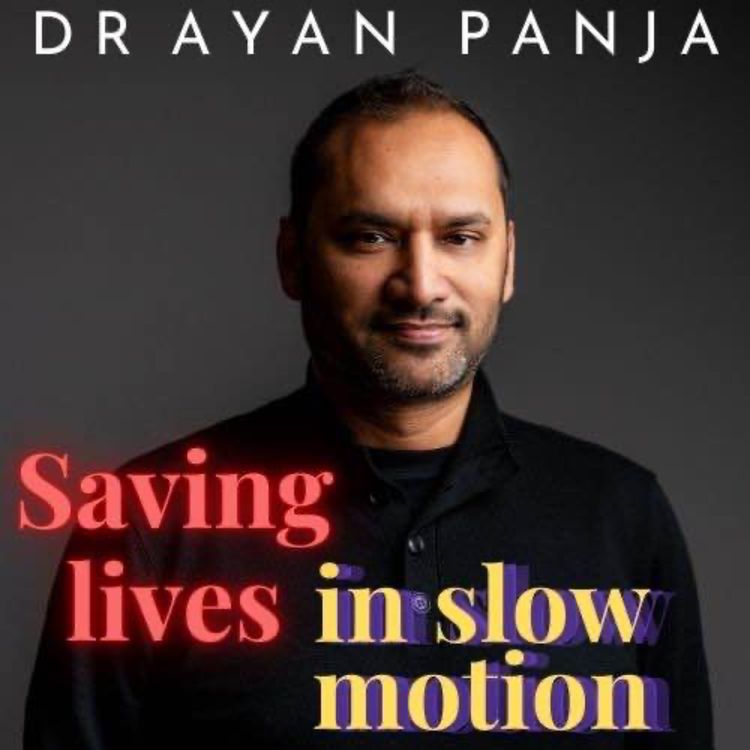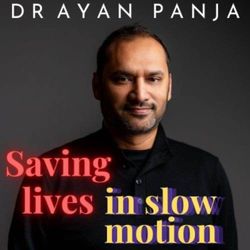Share

Saving Lives In Slow Motion
Decluttering your home - how it could have multiple benefits for your health
The evidence is compelling. Clutter can be harmful to our health in many ways from poor sleep, stress, anxiety and even physical pain. Why is this the case and what can we do about it?
Graham Hill - less stuff, more happiness: https://www.ted.com/talks/graham_hill_less_stuff_more_happiness?subtitle=en
Marie Kondo and her work: https://konmari.com/
Attention and the visual cortex: https://pubmed.ncbi.nlm.nih.gov/21228167/
Fals risk:
https://www.ncbi.nlm.nih.gov/pmc/articles/PMC10735369/\\
Eating behaviours and hoarding: https://pubmed.ncbi.nlm.nih.gov/25440599/
Procrastination and clutter: https://pubmed.ncbi.nlm.nih.gov/36767429/
Decluttering challenge: https://www.apartmenttherapy.com/10-10-100-decluttering-challenge-37394185
Clutter, sleep and fatigue: https://www.ncbi.nlm.nih.gov/pmc/articles/PMC9616259/
ADHD and clutter: https://www.additudemag.com/making-peace-with-your-clutter/
Save your life in slow motion and those of others by subscribing now and sharing. Thank you for listening and for your support. It means a lot to me.
More episodes
View all episodes

206. "Could it be something else doctor?" - Pyrroles, PFOs and EDS
15:06||Season 1, Ep. 206In this episode look at some rarer diagnoses, how they come to light and how they can be hard to live with and diagnose.Links: Pyrrole Disorder (not recognised in conventional medicine): https://www.healthline.com/health/pyrrole-disorderAcademic analysis of pyrroles (deep dive): https://academic.oup.com/labmed/article/55/3/334/7271490Patent foramen ovale: https://www.mayoclinic.org/diseases-conditions/patent-foramen-ovale/symptoms-causes/syc-20353487Migraines and PFO: https://www.migrainedisorders.org/diving-into-the-connection-between-migraine-and-patent-foramen-ovale/Ehlers-Danlos Syndrome: https://my.clevelandclinic.org/health/diseases/17813-ehlers-danlos-syndrome
205. Rest - why it’s essential to health (and not laziness)
15:29||Season 1, Ep. 205Rest is often seen as a guilty pleasure but in this episode I cover the reasons behind why rest is essential to our lives and examples that work.Links: Deep rest: https://pmc.ncbi.nlm.nih.gov/articles/PMC11003855/Rest Quiz: https://www.restquiz.com/quiz/rest-quiz-test/The Art of Rest: https://www.amazon.co.uk/Art-Rest-Find-Respite-Modern/dp/1786892804Attention Restoration Theory: https://positivepsychology.com/attention-restoration-theory/Nature breaks: https://pmc.ncbi.nlm.nih.gov/articles/PMC4039544/Rest during demanding tasks: https://pmc.ncbi.nlm.nih.gov/articles/PMC6585675
204. Second Opinions: why people seek them, the risks and the benefits
15:47||Season 1, Ep. 204Second opinions are an increasingly common request in healthcare and in this episode I look at reasons why people seek them and their pros and cons Links:Martha’s rule: https://www.england.nhs.uk/patient-safety/marthas-rule/Hyponatraemia (low sodium): https://www.mayoclinic.org/diseases-conditions/hyponatremia/symptoms-causes/syc-20373711Advice on second opinions: https://www.patients-association.org.uk/getting-a-second-opinionTumour Treating Fields: https://www.cancer.org/cancer/managing-cancer/treatment-types/tumor-treating-fields.htmlLithium and MND doesn’t work?: https://www.kcl.ac.uk/archive/news/ioppn/records/2013/march/lithium-shows-no-benefit-to-mnd-patientsLithium and MND works?: https://www.ucl.ac.uk/centre-for-neuromuscular-diseases/research/experimental-clinical-trials/mnd/motor-neurone-disease-closed-trials/licals-therapeutic
203. Invisible Habits that can sabotage our health - some reflections
15:14||Season 1, Ep. 203In this episode I look at things that can hamper our health journey by looking at our own life in an easy and compassionate way.Links:The Health Fix on Kindle offer January 2026: https://www.amazon.co.uk/Health-Fix-Dr-Ayan-Panja-ebook/dp/B0B2VTFFVS/ref=tmm_kin_swatch_0Sleep and its importance: https://pmc.ncbi.nlm.nih.gov/articles/PMC6281147/Phone and screen usage: https://pmc.ncbi.nlm.nih.gov/articles/PMC11236742/Decluttering: https://drayanpanja.substack.com/p/decluttering-your-home-how-it-could-1fd\\Exercise: https://www.sciencefocus.com/wellbeing/exercise-snacksImpulsivity: https://www.healthline.com/health/mental-health/impulsive-behavior#Impulsive-behavior-meaningOverwhelm: https://www.bbc.co.uk/sounds/play/m002pf4w
202. 2026 - the year of discernment and choices
14:35||Season 1, Ep. 202It’s a new year and that can feel overwhelming.In this episode I look at what the year is likely to bring in terms of health and medical trends, our own personal goals and how to generate ideas for them if you are feeling a bit stuck.Links: The Health Fix: https://www.amazon.co.uk/Health-Fix-Dr-Ayan-Panja-ebook/dp/B0B2VTFFVSMed tech in 2026: https://www.forbes.com/sites/bernardmarr/2025/10/27/the-8-biggest-healthcare-technology-trends-to-watch-in-2026/Misinformation - how to spot it: https://news.cancerresearchuk.org/2024/02/16/sorting-fact-from-fiction-a-guide-to-spotting-health-misinformation/
201. Christmas time reflection 2025
11:45||Season 1, Ep. 201Links:AI in medicine: https://www.england.nhs.uk/long-read/guidance-on-the-use-of-ai-enabled-ambient-scribing-products-in-health-and-care-settings/Various wearables: https://uk.wellnesspulse.com/lp/best-fitness-trackers/?campaignId=23304304009&adgroupId=&adId=&targetId=&device=c&gunique=CjwKCAiAmKnKBhBrEiwAaqAnZ4MBo1x_tOV7RB1FPjSEqiYWae8AyeixJJsGEVTlbapiaEWJL7D8cBoCYs8QAvD_BwE&gad_source=1&gad_campaignid=23300097782&gbraid=0AAAAAqKJRpkXwMKHsYb3EhuFeRzIdPUV2Health Check on BBC World Service: https://www.bbc.co.uk/sounds/play/w3ct6vk0Elinzanetant for menopause: https://www.gov.uk/government/news/mhra-approves-elinzanetant-to-treat-moderate-to-severe-vasomotor-symptoms-hot-flushes-caused-by-menopauseThe new weight loss drugs (GLP-1 agonists): https://my.clevelandclinic.org/health/treatments/13901-glp-1-agonistsExperimental Alzheimer’s Drug: https://www.sciencedaily.com/releases/2025/12/251222080119.htm
200. Episode 200: reflections, precision medicine and the one thing we should all be doing.
15:50||Season 1, Ep. 200This is my 200th episode and I reflect on where medicine is at in terms of precision medicine and what it means for us.Links:Please take this 10 minute survey to help keep this podcast going: http://bit.ly/savinglivesinslowmotion-surveyGenome sequencing: https://www.genomicsengland.co.uk/blog/what-happens-when-i-go-for-whole-genome-sequencingMepan Syndrome: https://umdf.org/mepan/Ketones in dementia: https://pmc.ncbi.nlm.nih.gov/articles/PMC8734638/London Bus study: https://cardiachealth.org.uk/the-london-busmen-study/Drumming - physical and mental therapy?: https://melodics.com/blog/mental-health-benefits-of-drumming
199. Traditional Medicine: ancient global healing knowledge in today’s world
15:52||Season 1, Ep. 199Traditional medicine has been around for thousands of years. In this episode I look at what we can learn from it and how it compares to modern allopathic medicine in its approach. Please take this 10 minute survey to help keep this podcast going: http://bit.ly/savinglivesinslowmotion-surveyLinks: WHO TCIM summit: https://www.who.int/teams/who-global-traditional-medicine-centre/global-summit-and-collaborations/second-traditional-medicine-global-summitWHO — Global strategies and WHO TCIM topic pages (authoritative overview of WHO’s stance and the Global Traditional Medicine Strategy 2025–2034). World Health Organization+1WHO feature: World Health OrganizationNIH/NCCIH pages on Ayurveda and Traditional Chinese Medicine. NCCIH+1African medicinal plants - a review: PMCPrunus africana: https://pmc.ncbi.nlm.nih.gov/articles/PMC5327751/Four sacred medicines: https://aihschgo.org/four-sacred-medicines/Ayahuasca: https://www.healthline.com/nutrition/ayahuascaIcaros: https://www.nimeakaya.org/how-icaros-help-heal-participants-in-ayahuasca-ceremonies/
198. Anti-ageing - what really works
16:35||Season 1, Ep. 198Anti-ageing means different things to different people. In this episode I look at what it means and what works to slow down the ageing process.Reactive oxygen species: https://www.ahajournals.org/doi/10.1161/circresaha.117.311401Mitochondria and ageing: https://www.nature.com/articles/s41574-021-00626-7Inflammation (inflammaging): https://www.nature.com/articles/s41574-018-0059-4Epigenetic drift: https://pmc.ncbi.nlm.nih.gov/articles/PMC12487821/Protein misaggregation: https://www.buckinstitute.org/blog/unraveling-aging-how-protein-misfolding-relates-to-aging-and-disease/Dietary patterns: https://www.medicalnewstoday.com/articles/fasting-like-diet-may-help-reverse-biological-aging-2-5-yearsGut microbes: https://www.nature.com/articles/s41575-022-00605-xRapamycin - an experimental drug for anti-ageing: https://www.thelancet.com/journals/lanhl/article/PIIS2666-7568(23)00258-1/fulltextSenolytics: https://pmc.ncbi.nlm.nih.gov/articles/PMC7405395/Stem cells: https://pmc.ncbi.nlm.nih.gov/articles/PMC10276889/NAD / NAD+: https://www.today.com/health/aging/nad-benefits-rcna180800